Written by: Mark Steele
Yaupon Holly tea was the center of civilization for millennia, yet it is largely unknown to modern consumers. Discover the robust history and the origins of this remarkable tea.
Uncovering the ancient roots of Yaupon Tea:
In 1982, a backhoe operator was pulling debris from a pond near Titusville, Florida. There was to be a roadway across the pond, and he was startled to discover several human skulls in the bucket of his machine. Work was stopped, and archaeologists were called in. More human remains were exhumed. Upon first glance, they assumed the bones were five or six hundred years old. Carbon dating proved them wrong; the skeletal remains were seven to eight thousand years old. Chemical analysis showed the presence of Yaupon Holly tea in the cadavers that was consumed three thousand years before tea was “discovered” in China… Learn more about the Windover Archeological Site here.

Rewind to 1100-1300 A.D., when beakers were widely used in daily life and religious ceremonies at the Cahokia complex in what is now southern Illinois. Chemical analysis proves that Yaupon was served in the beakers; caffeine and theobromine together mean Yaupon was present. We can only guess the significance and purpose of these beakers (fertility? Cleansing of sins? life renewal?) by the carved images on the outside of the cups. What is truly noteworthy is that Cahokia was over 400 miles from the nearest natural occurrence of Yaupon Holly. For people to carry huge packages of leaves on their backs for 400 miles implies they had precious cargo.

What is Yaupon Tea?
Yaupon holly tea is brewed from the leaves and stems of the Yaupon Holly tree. Yaupon holly is the only plant in North America with any meaningful amount of caffeine. Yaupon is usually found as an understory plant in Maritime Hammock locations (see map above) and can grow to 30 feet or more..

Yaupon was historically gathered and laid out to dry on mats for daily consumption, but in a pinch (like being in a war party), leaves were picked and dried in a pot over a fire, then mashed and boiled in water. Yaupon was at the heart of pre-battle religious ceremonies. Early Spanish explorers witnessed these rituals and dubbed Yaupon “the black drink.” At Rise Yaupon, we clean and sterilize our leaves, lay them out to dry, separate the berries, and grind and package our tea in teabags, making it easy to enjoy.

At Rise Yaupon, we like to say that the best thing about Yaupon tea is what’s missing from Yaupon tea: tannin and oxalates. Tannin is a chemical rapidly emerging from traditional Asian tea (Camelia sinensis) while steeping. It causes an upset stomach, teeth staining, and an astringent, bitter aftertaste. If you taste a black tea that has been steeping for 10 minutes or so, you will know what we mean. The tannin levels of Yaupon are imperceptibly low, and Yaupon Tea cannot be oversteeped in time or temperature. It has a mild, naturally sweet taste that does not require sugar. We think it is the best tea in the world.
Oxalates bind with calcium to form kidney stones. According to the University of Florida biology department, Yaupon is oxalate-free. Traditional teas (especially black tea) commonly contribute to kidney stone formation.

Yaupon Holly tea:
- Was a gift from the God of Purity (Yahola)
- Was described by Native Americans as the “White Drink” (purity), while Europeans called it the “Black Drink” (dark color)
- Was at the heart of vast commercial trading networks
- Was used as medicine (we now have the science to know the significant health benefits)
- Was used as a way to cleanse away sins and restore one’s spiritual/warrior purity in the eyes of God (this included purging rituals)
- Was used as an instrument of social cohesion:
- Want to make friends with a stranger? Greet them with tea
- Want to make peace with someone you’ve been fighting with? Offer them tea
- Have an important decision to make? Gather the group, drink Yaupon, and decide
- Want to get the warriors ready for battle? You guessed it, drink Yaupon tea.
A tragic side note about the Timucuan Nation of northern Florida: 70 to 90 percent of the tribe (estimated at over 700,000) were killed by smallpox. At that point, they could no longer defend their lands from other tribes, and warfare subsequently took its toll. The last 100 known Timucuans were sold into slavery (by the Spaniards) in 1750 to work in the sugar plantations of Cuba.

In 1789, right after England lost the Revolutionary War, American merchants began shipping Yaupon tea to Europe. This did not sit well with the British, who made enormous sums from their tea, sugar, and slavery conglomerate. William Aiton, the Royal Gardener and friend to George III decided to change the Latin name of Yaupon Holly plants to “Ilex vomitoria Ait.” He knew firsthand that Yaupon tea was not emetic (it was grown in the Royal Garden for 90 years before his renaming), but the name stuck and has tarnished (and you could say ruined) a fabulous tea for centuries—some claim British tea merchants paid him off. We will never know for sure.
During the Civil War, the Union blockade prevented tea and coffee from reaching southern ports, and Yaupon tea was the only caffeine alternative. After the war, it still carried the social stigma of being an “Indian” tea for poor whites and formerly enslaved people, not the proper tea of white aristocracy.
We meet Native Americans from various tribes at our farmers markets and other events, and most of them have never heard of Yaupon tea. A glance at the maps below tells the sad story.

Note that Yaupon does not grow in Oklahoma! Most of the religious and cultural uses of Yaupon went away after forced migration, and the British Empire was more than willing to supply tea from China and India to the (formerly British) colonies.
Health benefits
Yaupon tea was used medicinally for thousands of years, and we now have the science to know why. It is a natural anti-inflammatory and an antioxidant super-food, and it is especially good for gut health. It has caffeine in amounts similar to green tea but also has another stimulant called theobromine (the “pleasure” alkaloid found in chocolate). While similar to caffeine, theobromine offers alertness without the anxiety or jitters found in other caffeinated beverages. Scientists at Texas A&M claim that the flavonoids and polyphenols found in Yaupon tea help prevent cancer and stifle the formation of polyps in the large intestine. Read more of their findings here.
Environmental and local impact
Hands down, Yaupon tea is the most environmentally perfect source for Americans to get caffeine. Here’s why:
- Once established, it does not need pesticides, fertilizer, or irrigation
- Nothing is taken from or added to underlying aquifer systems (that is what a sustainable crop looks like!)
- It does not need to cross an ocean to get to your table. Just imagine the carbon footprint of importing 250,000 tons of tea and 3.5 billion pounds of coffee annually.
- Switching to American caffeine means many local jobs and farming opportunities right here.
Modern Yaupon Tea Industry
The sky's the limit! Recently, out of all the foods at Whole Foods Markets, Yaupon was picked as the number 1 food trend for 2023. The tea industry in America totals $13+ billion annually, and Yaupon is only in its infancy. We bring to market exactly what the modern consumer is looking for a chemically free, sustainable, and healthy tea from America that does not need sugar to taste great.
While the runway for tea looks excellent, Yaupon has other unique possibilities.
- Yaupon in powder form has astronomical anti-oxidant properties. Caffeinated superfood bagel, anyone?
- Exciting medical benefits have yet to be explored outside of laboratories. Inflammatory bowel or other digestive diseases can be helped with Yaupon. A scientist at Stetson University is killing Leukemia cells with Yaupon extract. How about refining out the chemicals that help prevent cancer?
Industry Challenges
When Native American tribes were decimated (in various ways), their culture was summarily rejected. We are bringing back an ancient, historic, and sacred tea from the dustbin of history. As Whole Foods has noted, Yaupon is too good to ignore any longer.
How to brew the perfect cup of Yaupon Tea
Making a perfect cup of Yaupon Tea is amazingly simple. Put a teabag of Yaupon (or an infuser containing loose Yaupon) into a cup. Add boiling water. When it’s cool enough to drink, it’s steeped enough to drink. Leave the teabag in your cup, and add more boiling water as needed. You should get 3 nice cups of tea from every teabag. We like to say, “steep it and keep it.” Please note that the first cup will contain most of the caffeine. Rise Yaupon offers a pure Yaupon blend, America’s Classic, or enjoy Yaupon blended with other ingredients to form various flavors.
This is possible because Yaupon is tannin-free and can’t be oversteeped in time or temperature. This contrasts with traditional Asian teas, where you steep it at the proper temperature for the correct time and then remove the leaves for maximum flavor just before tannins ruin the brew. Historically, sugar was added to help kill the taste of tannins. This is not needed with our Yaupon Holly teas.

While we think the great taste and health benefits of Yaupon make it very marketable on the world stage, as environmentalists, we are tired of seeing caffeine shipped across vast oceans. As mentioned, 250,000 tons of tea and 3.5 billion pounds of coffee are imported annually into this country. With our current climate issues, perhaps the place to start is Americans drinking American tea.
Conclusion and Future Outlook
It has been a rough road for America’s ancient, historic, and sacred tea. It is a story of cultural bias and brutal competition with the powerful conglomerates of the British Empire. We are excited to be a part of the re-emergence of this American industry:
- People care about having healthy, great-tasting tea without pesticides or other chemicals
- In the age of global warming concerns, consumers want locally-produced products
- Speaking of “locally-grown,” American products means American jobs
- Our customers love the fact that you don’t need to add sugar to kill the bitterness of traditional teas
- Our customers know what “sustainable” agriculture means and love us for it
- Rather than outright rejecting something from Native American culture, people want to know why Yaupon was at the center of civilization here for over eight thousand years. When they try Yaupon, they find the answer compelling. We hope you do, too.
FAQ’s
Q: Where can I buy authentic Yaupon tea?
A: The American Yaupon Association has a nice group of Yaupon entrepreneurs. We think our tea at Rise Yaupon is the best choice, and you can find us at Riseyaupon.com.
What makes Rise Yaupon better?
- We use Yaupon from the central coast of Florida, perfect for producing large, sweet Yaupon leaves.
- We naturally air-dry all of our tea, which takes several days. Baking saves time but also changes the flavor. We prefer the authentic taste of each leaf.
- We give customers 25% more tea than most competitors for the same price.
- We were established as a “give-back” company, hiring second-chance employees and donating $1 from each unit sold to feed children growing up in poverty.
Q: Can Yaupon tea make you sick?
A: Yaupon tea is not emetic. However, like all caffeinated beverages, you can poison yourself with caffeine by drinking dozens of cups in one sitting. Tannins in black tea can cause vomiting; Yaupon is tannin-free. If you DIY your tea, avoid the berries.
Q: How does Yaupon tea’s caffeine content compare to green tea or coffee?
A: Yaupon tea has roughly the same caffeine level as green tea (40-60mg per cup) but not as much as black tea (which has about half the caffeine in coffee.) Remember that caffeine levels can vary quite a bit in all these beverages.
Q: Are there any side effects from consuming Yaupon tea?
A: Yaupon is a natural anti-inflammatory that has been used medicinally for thousands of years. The only adverse side effects for some people are from the caffeine found in Yaupon. Consult your doctor if you have caffeine sensitivity.
Q: How can I support sustainable Yaupon Tea farming?
A: There must be a market for farm-produced Yaupon, so switching away from imported caffeine is an excellent place to start.
Q: Can I grow Yaupon Holly in my backyard?
A: That depends upon where you live. Here is a map of where Yaupon grows in the wild, and if you are in or close to this area, you will have a good chance of success.

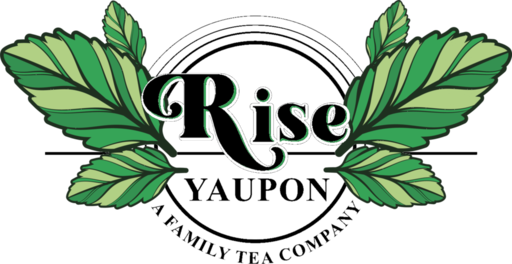
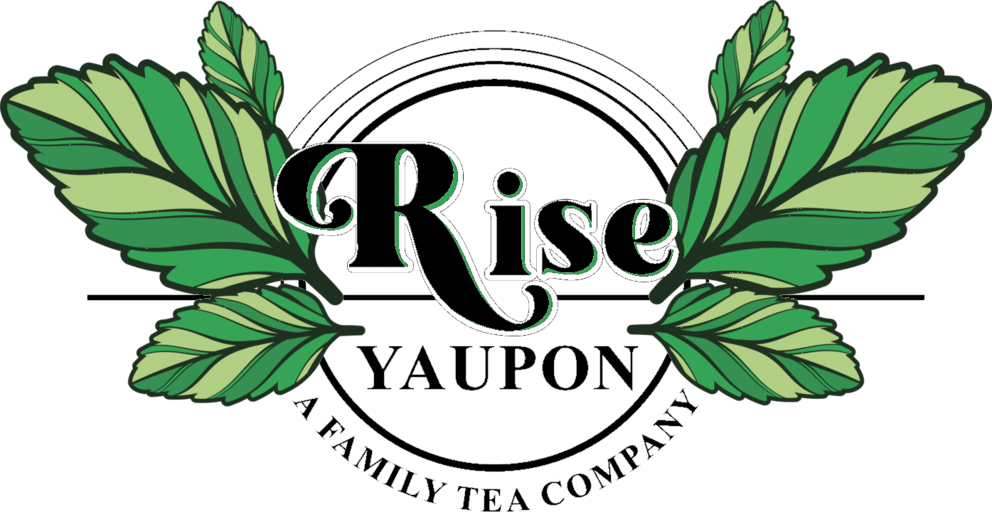
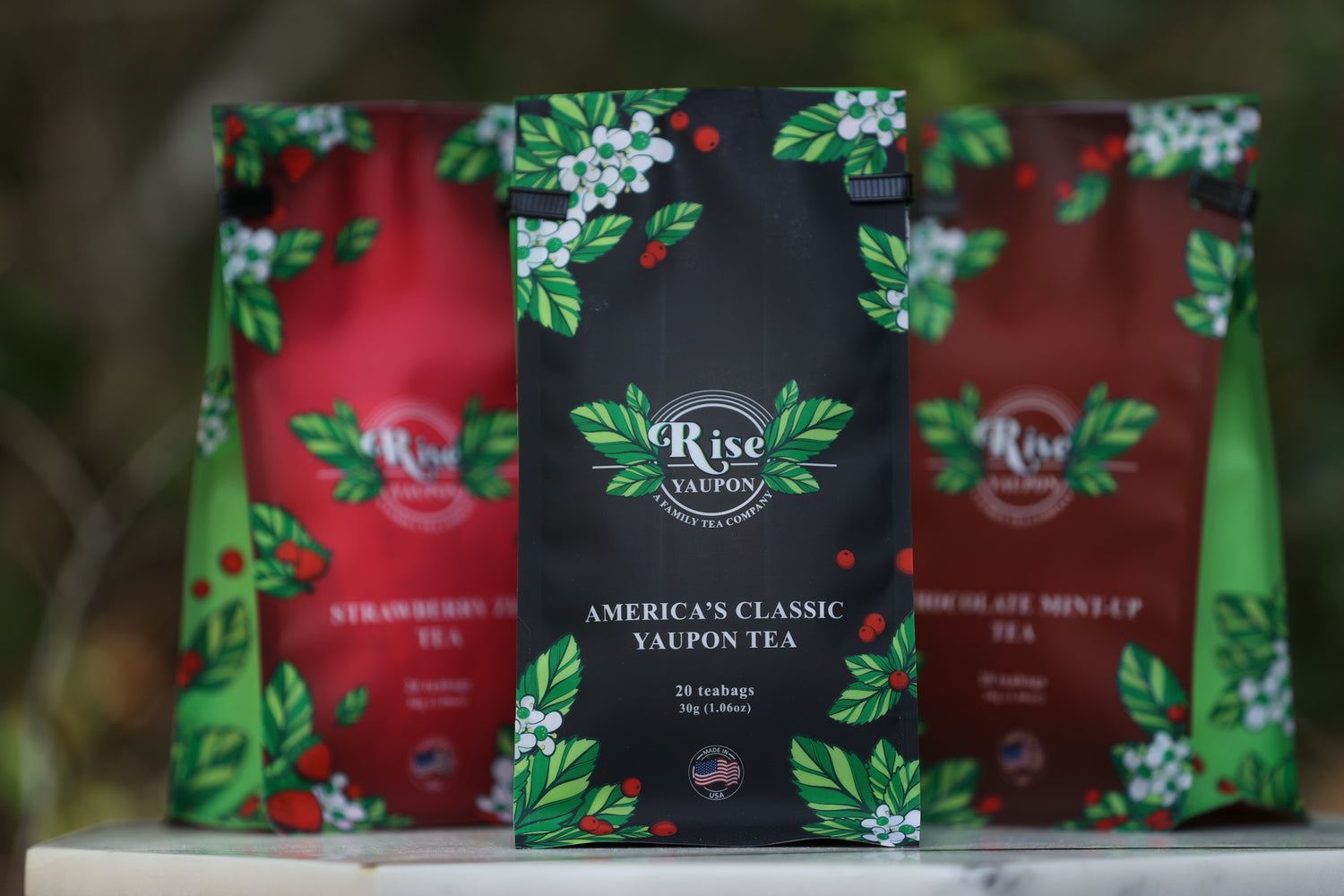
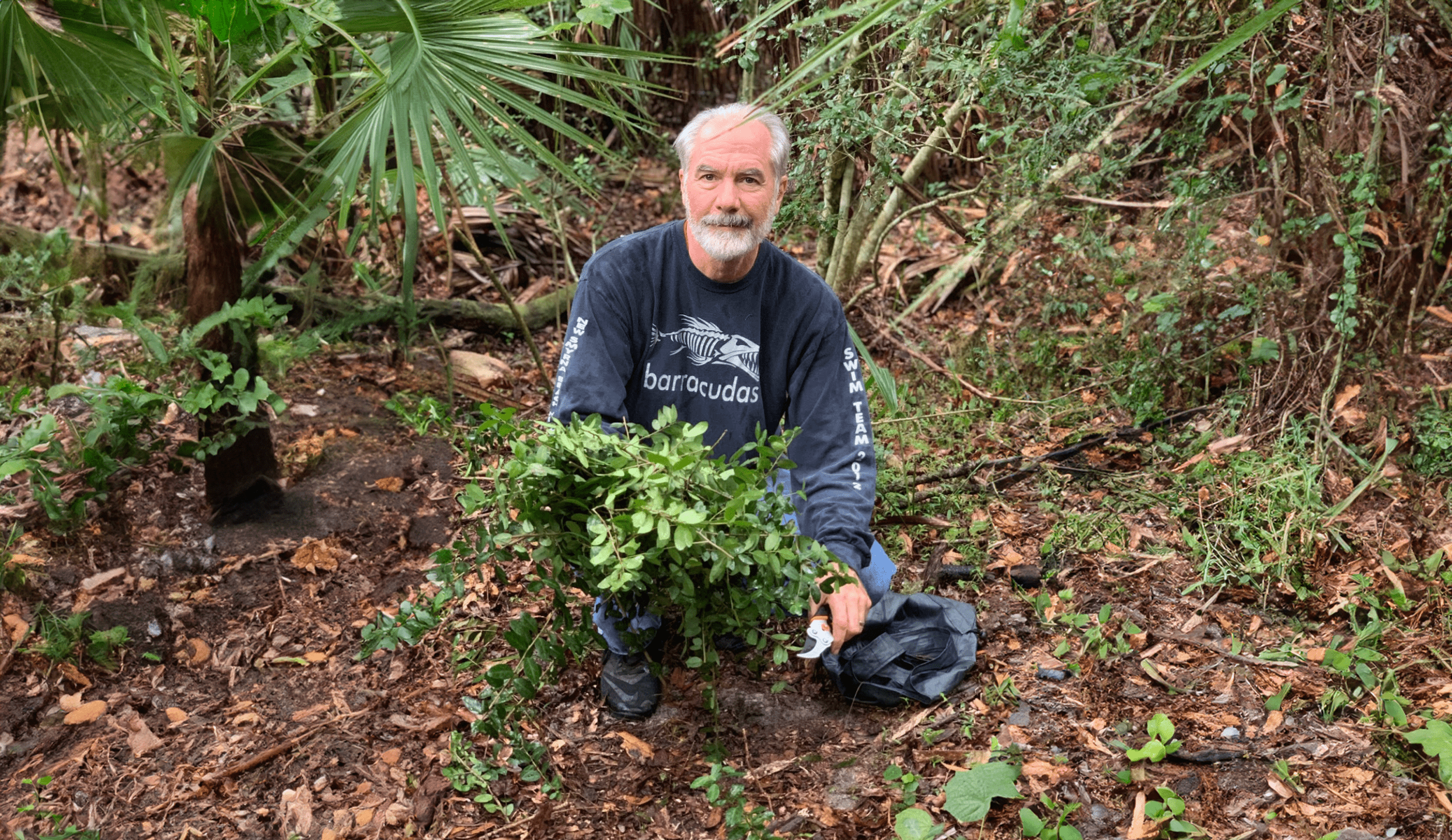
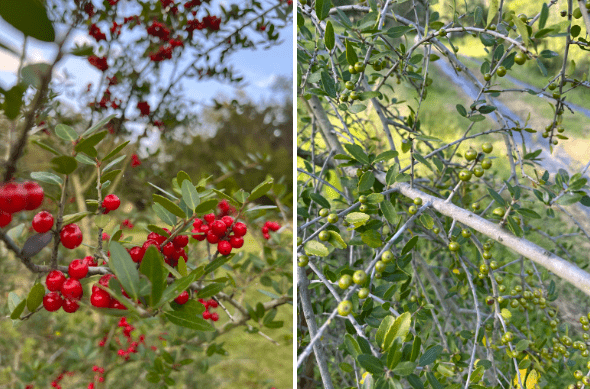
Leave a comment
This site is protected by hCaptcha and the hCaptcha Privacy Policy and Terms of Service apply.